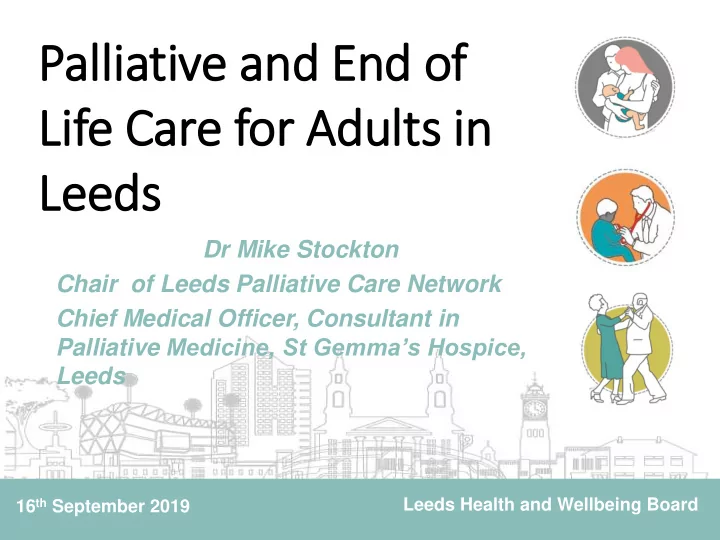

Pall lliative and End of Lif ife Care for Adults in in Leeds Dr Mike Stockton Chair of Leeds Palliative Care Network Chief Medical Officer, Consultant in Palliative Medicine, St Gemma’s Hospice, Leeds 16 th September 2019 Leeds Health and Wellbeing Board
National Context Around half of all deaths occur in hospital (the least preferred place) Uncontrolled symptoms result in hospital admission 1 in 3 emergency admissions are for people in the last year of life 30% of hospital in-patients are in the last year of life 20% of NHS costs are spent in the last year of life Palliative care can save cost overall especially if provided early Leeds Health and Wellbeing Board
Death and Dying in Leeds 6,850 deaths per year 75% of deaths estimated to benefit from palliative care approach (Etkind et al, BMC Medicine, 2017) 5,000 deaths per year across Leeds would benefit from palliative care approach Leeds Health and Wellbeing Board
Death and Dying in Leeds
Future trends: by 2040 · Annual deaths projected to rise 25% · Greatest rise in the aged 85+ group · In Leeds, up to 1,700 additional patients dying per year Palliative care need may rise as high as 40 per cent · Duration and complexity Cancer Dementia Multimorbidity Frailty Leeds Health and Wellbeing Board
Recognition and Pla lanning Ahead • Electronic Palliative Care Coordination System (EPaCCS) • Recommended Summary Plan for Emergency Care and Treatment (ReSPECT) EPaCCS in Leeds 2018/19 • 45% of people who died in Leeds has EPaCCS • 73% achieved preferred place of death • EPaCCS increases quality of care and likelihood of preferred place of death • Aspiration for 2019/20 is 60% uptake Leeds Health and Wellbeing Board
Stakeholder and community engagement Annual city centre event Death Cafes Building capacity Established 2015 Community grant scheme Training Multi-agency partnership • Leeds City Council • NHS Communications and marketing • University of Leeds • Voluntary Sector Website http://dyingmattersleeds.org/ • Private Sector Clear consistent key messages: • Write a will • Record their funeral wishes • Plan their future care and support • Consider registering as an organ donor • Tell their loved ones their wishes #dyingmattersLDS Leeds Health and Wellbeing Board
Leeds Palliative Care Network …what is it ?
Members Core Group Wider Partners
LPCN…highlights this last year • New website • Planning Ahead: EPaCCs and ReSPECT • Bereaved Carers Survey • Palliative Care Ambulance • Medicines Management • Tele-education (ECHO) • Dementia and EOL • Working on Population Outcomes and PHM Leeds Health and Wellbeing Board
DRAFT PEOLC Outcomes for Le Leeds
Draft Leeds Palliative and End of Life Care Framework for Adults ACCESS COMMUNICATION CARE MODELS VULNERABLE KIND & CARING AND GROUPS COMMUNITIES CO-ORDINATION COMMUNITY Equity of Access Advance Care Planning New Models of Care Learning Disability Public Awareness and Conversations Hospital Avoidance Earlier Integration EPaCCS and ReSPECT LCPs/ Primary Care Networks Prisons Carer Support Hospices Recognition Point of Care Information Homeless Bereavement Services CARE HOMES Vulnerable Groups Single Point of Access Enhanced Health in Gypsies & Travellers Neighbourhood Networks Care Homes Model Black Asian & Shared Decision Making Minority Ethnic Social Prescribing HOSPITAL Specialist Palliative Care LGBT Volunteers Dementia Leeds Directory TRANSFER OF CARE PERSONALISATION Dying Matters Children to Adults Transition MEDICINES MANAGEMENT DIGITAL ENHANCEMENT Clinical Data Sharing Remote Monitoring Telehealth and Education WORKFORCE Recruitment Retention capacity , capability, culture Training & development UNDERSTANDING POPULATION NEEDS Research Clinical Audit Data Analysis SYSTEM INTEGRATION AND WIDER DETERMINANTS OF HEALTH
Pri riorities for th the Future • Culture Shift : open and prepared to talk about death and dying • Access to care and services • Consistent recognition of need • Equity of access • Earlier integration • Single point of access • Communication and coordination : – increased use of Advance Care Planning – Interoperability • Out of Hospital care • Increased funding • Care Homes • New Models of care • Digital enhancement : clinical, workforce and data • Workforce : new roles, training and development
What are we Askin ing fr from You? - Recognise people receiving palliative care and those at end of life as a key priority population for the partnership and in city plans - Provide feedback on the draft population level outcomes for people at end of life, and on further engagement - Provide feedback on the draft Leeds Palliative and End of Life Framework - To initiate, address and measurably improve the EOL experience for people of Leeds Leeds Health and Wellbeing Board
THANK YOU Leeds Health and Wellbeing Board
Recommend
More recommend